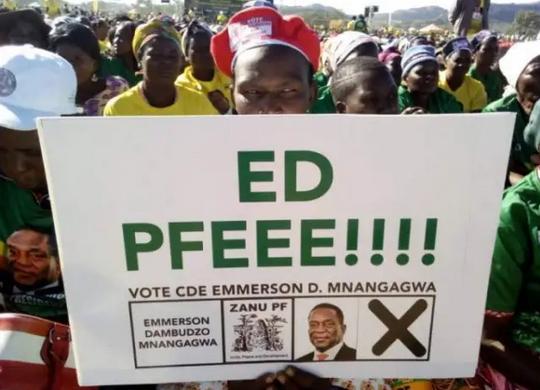News / National
Debate over Mnangagwa's ED2030 intensifies
28 Nov 2024 at 06:40hrs |
0 Views

The enduring push to extend President Emmerson Mnangagwa's tenure to 2030 continues to fuel controversy, despite the President's public insistence that he will step down when his constitutional term ends in 2028.
The debate, marked by tribal and regional undertones, has drawn widespread attention and sparked concerns over constitutional integrity and power dynamics within Zanu-PF.
Mnangagwa's Position on the Matter
President Mnangagwa has repeatedly asserted that he is committed to constitutionalism, emphasizing that he intends to step down in 2028. To underscore his stance, he has even taken legal action against media outlets perpetuating claims of his extended presidency.
At Zanu-PF's annual conference in October, Patrick Chinamasa, the party's secretary for legal affairs, reiterated Mnangagwa's position, stating that the President had personally assured him on multiple occasions that he was not seeking to extend his term.
Yet, the debate persists, with calls for an extension growing louder and more divisive.
The Tribal and Regional Angle
Recent revelations have added a troubling dimension to the issue. According to a report by The Standard, Simon Muchafa, a member of the Zanu-PF provincial executive, has openly advocated for Mnangagwa's continued rule, citing tribal considerations.
Muchafa argued that allowing Vice-President Constantino Chiwenga, a Zezuru like former President Robert Mugabe, to succeed Mnangagwa would perpetuate tribal dominance. Mnangagwa, a Karanga, is seen as a counterbalance to the Zezuru faction, and his allies appear intent on maintaining their grip on power.
Amplifying the Message
Local Government Minister Daniel Garwe recently called on party structures to actively promote the agenda of extending Mnangagwa's presidency, invoking both constitutional and divine justifications.
Garwe claimed that while compliance with the Constitution is essential, the "vision from God" aligns with Mnangagwa's continued leadership to fulfill national development goals.
He dismissed Chinamasa's comments as a personal opinion, urging Mashonaland East officials to rally behind the extension campaign.
Constitutional Safeguards and Concerns
Douglas Mwonzora, one of the drafters of Zimbabwe's Constitution, recently reminded the nation that the charter was designed to prevent the extension of presidential term limits. However, many fear that political will and power struggles could undermine these safeguards.
The ongoing debate highlights the risks of concentrated power, echoing Lord Acton's famous observation: "Power tends to corrupt, and absolute power corrupts absolutely."
A Nation at a Crossroads
Zimbabwe now finds itself at a critical juncture. The question is whether the country will uphold constitutional principles or allow political and tribal interests to dictate its future.
As Mnangagwa's public declarations clash with the actions of his supporters, the nation watches closely, with its democratic framework hanging in the balance.
The debate, marked by tribal and regional undertones, has drawn widespread attention and sparked concerns over constitutional integrity and power dynamics within Zanu-PF.
Mnangagwa's Position on the Matter
President Mnangagwa has repeatedly asserted that he is committed to constitutionalism, emphasizing that he intends to step down in 2028. To underscore his stance, he has even taken legal action against media outlets perpetuating claims of his extended presidency.
At Zanu-PF's annual conference in October, Patrick Chinamasa, the party's secretary for legal affairs, reiterated Mnangagwa's position, stating that the President had personally assured him on multiple occasions that he was not seeking to extend his term.
Yet, the debate persists, with calls for an extension growing louder and more divisive.
The Tribal and Regional Angle
Recent revelations have added a troubling dimension to the issue. According to a report by The Standard, Simon Muchafa, a member of the Zanu-PF provincial executive, has openly advocated for Mnangagwa's continued rule, citing tribal considerations.
Muchafa argued that allowing Vice-President Constantino Chiwenga, a Zezuru like former President Robert Mugabe, to succeed Mnangagwa would perpetuate tribal dominance. Mnangagwa, a Karanga, is seen as a counterbalance to the Zezuru faction, and his allies appear intent on maintaining their grip on power.
Amplifying the Message
Local Government Minister Daniel Garwe recently called on party structures to actively promote the agenda of extending Mnangagwa's presidency, invoking both constitutional and divine justifications.
Garwe claimed that while compliance with the Constitution is essential, the "vision from God" aligns with Mnangagwa's continued leadership to fulfill national development goals.
He dismissed Chinamasa's comments as a personal opinion, urging Mashonaland East officials to rally behind the extension campaign.
Constitutional Safeguards and Concerns
Douglas Mwonzora, one of the drafters of Zimbabwe's Constitution, recently reminded the nation that the charter was designed to prevent the extension of presidential term limits. However, many fear that political will and power struggles could undermine these safeguards.
The ongoing debate highlights the risks of concentrated power, echoing Lord Acton's famous observation: "Power tends to corrupt, and absolute power corrupts absolutely."
A Nation at a Crossroads
Zimbabwe now finds itself at a critical juncture. The question is whether the country will uphold constitutional principles or allow political and tribal interests to dictate its future.
As Mnangagwa's public declarations clash with the actions of his supporters, the nation watches closely, with its democratic framework hanging in the balance.
Source - online
Join the discussion
Loading comments…

























